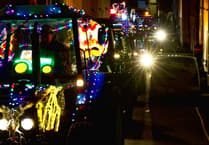LOVERS of the great outdoors are waiting anxiously for a legal ruling by the High Court in London which they fear could ban camping on Dartmoor, writes Guy Boswell.
As the Times went to press the outcome of the judicial ruling was expected which could end wild camping on unfenced wild land on southern Dartmoor belonging to a landowner.
A judge was due to rule on the legal challenge by landowner Alexander Darwall against the Dartmoor National Park Authority to end the legally enshrined right to camp on sections of the moor which has been permitted since 1985.
Dartmoor and Devon-wide locals were fighting back with mass protests in Princetown on Sunday and outside the High Court last weekend and on Monday (December 12). They braved freezing temperatures and waved banners supporting the right to wild camp which has been enjoyed by schools, Scouts, the military and families and dog walkers for decades.
They fear that if the landowner wins, it would lead to further challenges by landowners and the end of wild camping – Dartmoor is the only place in England and Wales where it is legal to wild camp in designated areas without the landowners’ permission.
Professional explorer Sam McNeill, from Princetown, and her husband Jim, a polar explorer, joined the protest in Princetown.
Sam said: ‘I fully support wild camping continuing and oppose any move to ban it through the courts by landowners. All wild spaces which not fenced off should be open to everyone.
‘It’s also good for mental health and wellbeing through exercise, rather than people being cooped up indoors all the time.’
She added: ‘I worry a ban on camping would be the next step to further restrictions for landowners’ own interests instead of the wider public’s desire to enjoy freedom and the right to sleep under the stars in a sensible responsible way.
Jim said: ‘I don’t think it’s right that landowners should be allowed to put such restrictions on people using wild undeveloped land. Most people camping do so because they respect and have a love of wild spaces.’
Local farmers, known as commoners, have long had the right to graze their livestock on unenclosed parts of the moor, where camping is also allowed under the Dartmoor Commons Act bylaws.
Mr Darwall seeks to say that the act ‘does not include a right of wild camping’ and that ‘members of the public are not entitled to pitch tents or occupy Stall Moor (on his land) overnight without his consent’.





Comments
This article has no comments yet. Be the first to leave a comment.